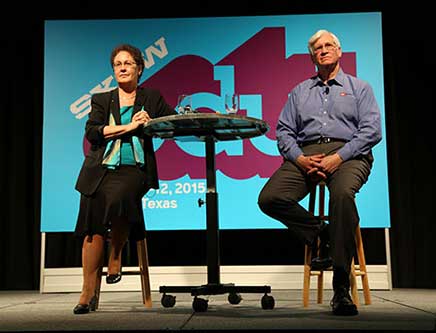SXSWedu Recap: Project-based Learning and Practical Application

All too often, standardized assessments are considered the final step in evaluating the effectiveness of a learning environment. Standardized assessments often disregard the fact that there are many more paths to the same successful outcome for a student, and tests don’t necessarily adequately assess a student’s development in areas other than their ability to retain facts and formulas.
The ability of assessments to accurately evaluate a learning environment falls short for three main reasons:
►Assessments have a narrow focus. Zak Malamed at ‘The State and Future of Student Rights” session at SXSWedu 2015 actively stressed a student’s “right to a fair assessment.” According to Austin Community College student Joey Vega, a fair assessment “would be able to test someone on all aspects of their education, like interpersonal skills and critical thinking.”
►Assessment results aren’t always used in constructive ways. The analysis of the results from many standardized assessments is seen as the concluding step in evaluating and improving the education system. Immediate feedback of these results to students and teachers would produce the largest gains in leaning. The results of assessments have to be seen as a springboard for productive development and discussion on how to better tailor education to the needs of students.
►The voice of the single most important stakeholder, the student, is not being heard. A student can help to accurately judge how effective teaching methods and learning environments are. Their views, while extremely important, are often not heard by the administrators making decisions regarding their education.
In my opinion, the idea of project-based learning that writer Linda Darling-Hammond and Executive Director of LEGO Education Stephan Turnipseed discussed seems to be an interesting and creative solution to the previously mentioned issues. Adopting a project-based curriculum and providing real workplace experiences to students would broaden the focus of education and assessments beyond curriculum to include critical thinking and problem-solving skills. A broader, more creative approach to educating students is needed.
“Policy has to get out of the way to make the world safe for good practice. The creative process can be assessed in a consistently creative way,” said Linda Darling-Hammond.
Tools and ideas to transform education. Sign up below.
As a high school journalist, I have experienced the benefits of a project based curriculum and a school that produces a workplace environment for me to work in firsthand. As a newspaper student I have had the experience of working as part of a staff and also managing one to produce an entirely student-produced publication.
Ellie Breed attends Stephen F. Austin High School in Austin, Texas.
